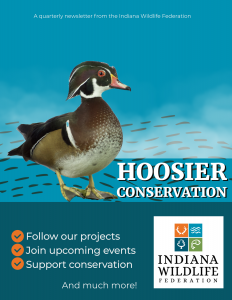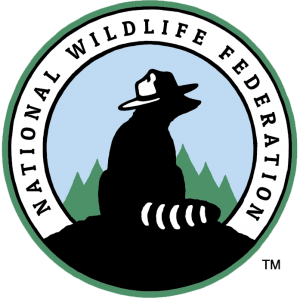Read the November 2021 edition of the IWF Hoosier Conservation Newsletter.

Month: November 2021
D.C. Legislative Update: November 15-19, 2021
Check here for the 2021 Senate Calendar
Check here for the 2021 House Calendar
Upcoming Congressional Hearings
- Senate Energy and Natural Resources Committee
- Tuesday, November 16 at 10am EST: Business meeting to consider pending nominations, including Laura Daniel-Davis to be an Assistant Secretary of the Interior (Land and Minerals Management) and Sara Bronin to be Chairman of the Advisory Council on Historic
- Tuesday, November 16 at 10am EST: “Hearing On Domestic And International Energy Price ”
- Thursday, November 18 at 10am EST: “Business Meeting To Consider Pending Legislation,” including a number of public lands and forestry bills. See here for the full list.
- House Foreign Affair Committee
- Tuesday, November 16 at 10am EST: Subcommittee: Europe, Energy, the Environment and Cyber hearing on “National Security Implications of Climate Change in the Arctic.”
- House Natural Resources Committee
- Tuesday, November 16 at 10am EST: Subcommittee on Energy and Mineral Resources hearing on “Oversight: Plugging in Public Lands: Transmission Infrastructure for Renewable Energy.”
- Tuesday, November 16 at 2pm EST: Legislative Hearing” to consider a number a bills, including H.R. 5770, the Forage Fish Conservation Act of 2021.
- Wednesday, November 17 at 10am EST: Markup of a number of wildlife and environment See the full list here.
- House Transportation and Infrastructure Committee
- Tuesday, November 16 at 10am EST: Subcommittee on Coast Guard and Maritime Transportation hearing on “Rebuilding Coast Guard Infrastructure to Sustain and Enhance Mission”
- Wednesday, November 17 at 10:30am EST: “Industry and Labor Perspectives: A Further Look at North American Supply Chain”
- House Agriculture Committee
- Tuesday, November 16 at 10am EST: Subcommittee on Commodity Exchanges, Energy, and Credit hearing on “A Look at the Renewable Economy in Rural America.”
- Wednesday, November 17 at 10am EST: Subcommittee on Livestock and Foreign Agriculture hearing on “Trade Policy and Priorities.”
- Senate Finance Committee
- Tuesday, November 16 at 10:15am EST: ”Hearing to Consider the Nominations of The Honorable Maria Louise Lago, of New York, to be Under Secretary of Commerce for International Trade and Lisa Wang, of the District of Columbia, to be an Assistant Secretary of Commerce.”
- House Energy and Commerce Committee
- Tuesday, November 16 at 10:30am EST: Subcommittee on Environment and Climate Change and the Subcommittee on Energy hearing on “Securing America’s Future: Supply Chain Solutions for a Clean Energy “
- Senate Environment and Public Works Committee
- Wednesday, November 17 at 10am EST: “Hearing on the Nomination of Martha Williams to be Director of the S. Fish and Wildlife Service of the Department of the Interior.”
- Senate Commerce, Science, and Transportation Committee
- Wednesday, November 17 at 10am EST: “Executive Session and Nominations ”
- House Science, Space, and Technology Committee
- Wednesday, November 17 at 10am EST: Subcommittee on Energy hearing on “Fostering a New Era of Fusion Energy Research and Technology Development.”
- Senate Agriculture, Nutrition, and Forestry Committee
- Wednesday, November 17 at 10:30am EST: “To consider the following nominations: Chavonda J. Jacobs-Young to be Under Secretary of Agriculture for Research, Education, and Economics, USDA and Margo Schlanger to be an Assistant Secretary of Agriculture, ”
- House Select Committee on the Climate Crisis
- Thursday, November 18 at 9:30am EST: Hearing on “Tribal Voices, Tribal Wisdom: Strategies for the Climate ”
- Senate Homeland Security and Governmental Affairs Committee
- Thursday, November 18 at 10:15am EST: “Nominations of Erik Hooks to be Deputy Administrator, Federal Emergency Management Agency, U.S. Department of Homeland Security; the Honorable Michael Kubayanda to be a Commissioner, Postal Regulatory Commission; Laurel A. Blatchford to be Controller, Office of Federal Financial Management, Office of Management and Budget; and Ebony M. Scott and Donald W. Tunnage to be Associate Judges, Superior Court of the District of Columbia.”
Congressional News
- 2372, the Recovering Americas Wildlife Act, now has 33 Senate cosponsors. NWF will continue pushing for more cosponsors and advocating for this critical wildlife conservation bill.
- In recent weeks, the Senate Appropriations Committee released the remainder of its appropriations bills for the fiscal year See the Committee’s website here for the full text of each bill.
Administrative News
- In previous weeks, the EPA issued its proposed rule strengthening, and expanding, methane limits on new oil and gas sector See here for NWF’s press release in support.
- See here for White House resources, including a comprehensive list of Executive orders to address COVID, the climate crisis, and environmental justice, among other topics.
What’s Happening This Week
- The House and Senate are both in session this week.
- The House is expected to consider, and vote on, the Build Back Better Act this week.
- The Senate is expected to take up the National Defense Authorization Act for Fiscal Year 2022 this
- NWF continues to work to advance our priorities on Capitol Hill, so please feel free to share NWF’s 117th Congress National Policy Agenda.

CWD Bill Could Provide the Funding and Research Needed to Fight Deer Disease
View original blog at: https://www.nwf.org/Outdoors/Blog/11-03-2021-Chronic-Wasting-Disease
Nov 03, 2021
It seems to never fail in recent years that as Halloween approaches, someone writes about “zombie deer” in regards to Chronic Wasting Disease (CWD), which affects cervids like deer, elk, and moose. As a deer hunter who cares deeply about the conservation of the species I hunt, I cringe every time I read this, as deer do not turn into zombies and trivializing the disease does little to stop it. The new bipartisan CWD Management and Research Act, though, could help with what is really needed to combat CWD: research and funding.
Chronic wasting disease (CWD) is a serious issue affecting wildlife and it has no easy solutions. CWD is a prion disease, related to “mad cow disease,” that leaves cervids like deer, elk, and moose emaciated, wasting away. It is always deadly, either directly or through the effects of its symptoms, though wildlife can be infected and spread the disease long before they show symptoms.
While it has not jumped the species barrier to humans yet, people are advised not to eat the meat of a deer or elk infected by CWD. Hunters in areas positive for CWD should test their game before cooking it. As the disease spreads, these concerns could also depress the hunting participation that pays for the bulk of wildlife conservation efforts. It will take scientific research into how its spread and funding for strapped state wildlife agencies trying to manage it. And that’s exactly what the recently-introduced bipartisan CWD Research and Management Act would provide.
CWD Research and Management Act
The Chronic Wasting Disease Research and Management Act (HR 5608) authorizes $70 million annually in CWD funding, split evenly between management funding to be granted out to state wildlife and agriculture agencies and tribal nations, and funding for CWD applied research grants administered by the USDA. It was introduced by Reps. Ron Kind (D-Wis.) and Glenn Thompson (R-Pa.) and has already passed the House Agriculture Committee.
“Southwest Wisconsin has been ground zero for CWD in whitetail deer country for 20 years,” said Doug Duren, a southwest Wisconsin farmer and deer hunter who organized a carcass disposal program to reduce the spread of CWD. “For a variety of reasons, the disease continues to spread and grow in prevalence. In parts of the area prevalence has grown to 50% or more in bucks. Several counties are seeing 20-25% positive rates in all deer tested. Deer numbers are still high in many areas, but as disease prevalence grows, the deer herd is and will trend younger. We need to work on Healthy Deer Management and ensure this resource for the future.”
The management section of the act will prioritize funding where incidence of CWD is the highest, where jurisdictions have the highest financial commitment to managing, monitoring, surveying, and researching CWD, for efforts to develop comprehensive CWD management plans, to areas showing the greatest risk for initial occurrences of CWD, and to areas responding to new outbreaks of CWD.
“Although many hunters and concerned citizens have worked creatively and cooperatively with Wisconsin Department of Natural Resources to fight the disease by providing carcass disposal dumpsters, convenient testing drop-off kiosks and education on CWD, efforts have been limited by funding,” said Duren. “To fight CWD we need to ‘Buy time and Pay for science’ and the new funding included in the CWD Research and Management Act will help scientists, game managers, hunters and the public do just that.”
The research section will be administered by the USDA through cooperative agreements and prioritize methods to test CWD in live deer and the environment, testing methods on non-live cervids, genetic resistance to CWD, sustainable cervid harvest management practices to reduce CWD occurrence, and factors contributing to local occurrence of CWD.
The National Wildlife Federation adopted a resolution in 2017 calling for the creation of a federal Fish and Wildlife Disease Trust Fund to respond to wildlife diseases like CWD to provide rapid response funding to states for fish and wildlife disease outbreaks..
“Chronic wasting disease is one of the greatest threats facing deer, elk, and moose populations across the country, jeopardizing hunting opportunities, ecosystems, and our nation’s outdoor economy,” said Mike Leahy, director for wildlife, hunting, and fishing policy for the National Wildlife Federation. “We are grateful for Representatives Kind and Thompson’s steadfast leadership on this critical issue. The bipartisan Chronic Wasting Disease Research and Management Act will help ensure state and Tribal agencies on the front lines of controlling this disease have the resources they need to better understand and stop its spread.”
The legislation is supported by the National Wildlife Federation, the Congressional Sportsmen’s Foundation, the Theodore Roosevelt Conservation Partnership, the National Deer Association, the Mule Deer Foundation, the Boone & Crockett Club, and the Rocky Mountain Elk Foundation.
As a Michigan deer hunter living in a state with CWD, I’m encouraged that real solutions and funding are advancing. I’m looking forward to deer camp in November, hopefully harvesting some venison, and having the deer tested for CWD to ensure that it’s safe to eat. Research and management funding is what our deer and elk need, not sensational headlines about “zombie deer.” The real effects of CWD are scary enough.

Drew YoungeDyke is the Director of Conservation Partnerships for the National Wildlife Federation Great Lakes Regional Center, strengthening the federation’s partnerships with independent affiliate conservation organizations in Ohio, Indiana, and Illinois, as well as managing media outreach and communications for the region.
2021 IWF Annual Member Meeting: Proposed Bylaws Amendments
To maintain clear transparency of our organization, the IWF annually hosts a meeting with members to share updates, track progress on goals, and to make any amendments to our bylaws. Members are invited to attend this virtual meeting to be hosted on:
IWF Annual Member Meeting
Thursday, December 2nd, 2021
6:00-7:00pm
>> Click to Review Proposed IWF Bylaws Changes<<
Proposed changes to bylaws were approved by the board on 10-27-21 and are shown in red. These bylaws changes in general are related to our board processes shifting largely to virtual communications during COVID 19. The redlined portions reflect in certain and limited cases, usually regarding legislation, the board may need an expedited vote via electronic means.
To register and receive your meeting link, please send an RSVP email to: wood@indianawildlife.org
